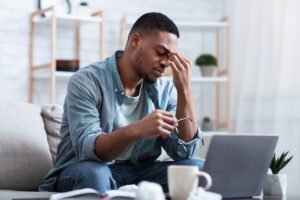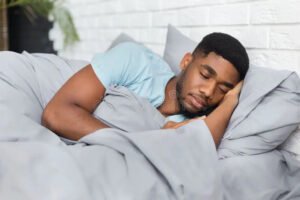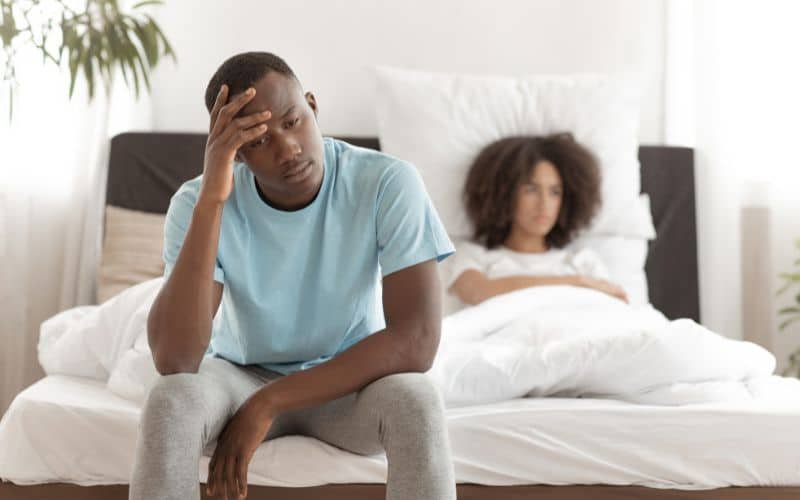Lack of exercise plays a surprisingly crucial role when it comes to erectile dysfunction (ED), often attributed to various health and lifestyle factors.
For men, especially African men, who may face higher health risks due to lifestyle and cultural factors, understanding the connection between physical activity and ED can be transformative.
Erectile dysfunction, marked by the inability to achieve or maintain an erection, is often associated with age or stress, but physical inactivity is another hidden culprit.
Regular exercise supports cardiovascular health, hormone regulation, and emotional wellness, all critical elements in sexual function.
This article dives into how lack of exercise can lead to ED, the physiological reasons behind it, and effective ways to combat it.
Understanding Erectile Dysfunction and Its Causes

Erectile dysfunction is a complex condition affected by various psychological, physical, and lifestyle factors.
While some may face ED due to specific medical conditions like diabetes or hypertension, lifestyle habits—such as physical inactivity, poor diet, and high stress levels—play a significant role.
Some primary causes of ED include:
-
Cardiovascular Diseases
Since erections rely on proper blood flow, any condition that hinders this process, such as clogged arteries or heart disease, can contribute to ED.
-
Diabetes
Diabetic patients often experience nerve damage that affects sexual response.
-
Obesity and Metabolic Syndrome
These conditions impair blood flow, increase inflammation, and contribute to hormonal imbalances.
-
Psychological Factors
Stress, anxiety, and depression affect mental health, reducing libido and causing performance issues.
Exercise can significantly reduce the risk of these health issues, thus preventing the onset of ED.
A sedentary lifestyle, however, heightens the likelihood of experiencing these problems, emphasizing the importance of regular physical activity for sexual wellness.
How Lack of Exercise Contributes to Erectile Dysfunction

1. Poor Cardiovascular Health
One of the primary ways lack of exercise impacts erectile function is through cardiovascular health.
Furthermore, exercise strengthens the heart and promotes efficient blood flow throughout the body, including the penis.
Lack of physical activity can result in poor blood circulation, increasing the likelihood of ED.
-
Reduced Blood Flow
Physical inactivity contributes to clogged arteries, high cholesterol, and hypertension, all of which decrease blood flow to the penis and make erections challenging to sustain.
-
Lowered Nitric Oxide Production
Exercise helps the body release nitric oxide, a chemical that dilates blood vessels and supports blood flow during erections.
2. Hormonal Imbalances
Regular exercise is essential for maintaining hormonal balance, especially testosterone levels.
Testosterone is a vital hormone in men’s sexual health, affecting libido and erectile quality.
Lack of exercise disrupts hormone regulation, resulting in low testosterone levels, which are strongly associated with ED.
-
Increased Cortisol Levels
Inactive lifestyles can lead to higher cortisol levels, a stress hormone. High cortisol disrupts testosterone production, indirectly affecting sexual desire and function.
-
Lowered Testosterone Production
Exercise, particularly strength training, boosts testosterone. In contrast, inactivity contributes to lower testosterone levels, exacerbating ED and reducing libido.
3. Obesity and Its Impact on Sexual Health

A lack of physical activity often leads to weight gain, increasing the risk of obesity and related health conditions.
Also, Obesity is a significant contributor to ED, as it disrupts hormone levels, reduces blood flow, and impacts self-esteem.
-
High Body Fat and Low Self-Esteem
Obesity affects physical health and can lead to self-esteem issues, creating performance anxiety and contributing to ED.
-
Inflammation
Excess fat increases inflammation, affecting vascular health and testosterone production.
4. Increased Stress and Mental Health Challenges

Mental health significantly impacts sexual function.
Physical activity reduces stress, improves mood, and boosts confidence, whereas inactivity can worsen anxiety, depression, and self-image issues.
These psychological factors can lead to or exacerbate ED.
-
Increased Anxiety
Lack of exercise contributes to higher anxiety levels, which can directly affect sexual performance.
-
Reduced Confidence
Physical activity promotes a positive self-image.
Moreover, Without exercise, men may feel less confident in their physical abilities, increasing performance anxiety and leading to ED.
5. Diminished Stamina and Endurance
Physical fitness is directly tied to endurance, strength, and stamina—essential for sexual activity.
Moreover, regular exercise builds endurance, while inactivity contributes to fatigue and weakness, which can lower sexual performance and reduce satisfaction for both partners.
-
Low Energy Levels
Inactive men often experience lower energy levels, making it challenging to sustain physical activity.
-
Reduced Stamina
What’s more, physical activity builds the stamina necessary for prolonged sexual encounters. Sedentary men may struggle with endurance, further reducing sexual satisfaction and confidence.
The Benefits of Exercise in Preventing Erectile Dysfunction
Regular exercise is a practical, natural method to reduce the risk of ED.
Here’s how incorporating various types of exercise supports sexual health:
1. Cardiovascular Exercises
Activities like running, cycling, and swimming improve heart health, facilitating blood flow to the penis.
In addition, cardiovascular exercises also help maintain weight, control blood pressure, and increase nitric oxide levels.
-
Improved Blood Flow
Enhanced cardiovascular health directly impacts blood flow, supporting stronger erections.
-
Weight Control
Cardio helps maintain a healthy weight, reducing the risk factors associated with ED.
2. Strength Training

Weightlifting and resistance training are known to increase testosterone levels, which is essential for sexual health.
Also, Strength training supports lean muscle growth, improves body composition, and reduces body fat.
-
Higher Testosterone Levels
Resistance training stimulates testosterone production, which is essential for libido and sexual function.
-
Enhanced Confidence
Improved body image boosts self-esteem, reducing performance anxiety and ED symptoms.
3. Flexibility and Core Strength
Stretching and core-strengthening exercises, such as yoga or Pilates, can improve posture, flexibility, and physical performance.
These exercises help alleviate lower back pain and tension, providing greater ease and comfort during intimate activities.
-
Reduced Tension
Improved flexibility helps minimize body stiffness, making sexual activity more comfortable.
-
Enhanced Control
Strong core muscles provide stability, improving endurance and control during sexual activity.
Simple Steps to Regain Sexual Health
If lack of exercise contributes to ED, incorporating physical activity into daily routines can reverse or prevent the condition.
Here are some tips for getting started:
1. Set Realistic Goals
Start with manageable goals, such as walking or jogging for 20 minutes daily, and gradually increase your workout intensity and duration.
2. Incorporate a Variety of Exercises
Aim for a balanced mix of cardio, strength training, and flexibility exercises to cover all aspects of fitness.
3. Consistency is Key
Establishing a routine is essential for sustained benefits. Aim for at least 150 minutes of moderate or 75 minutes of intense activity each week.
4. Monitor Your Progress
Track improvements in stamina, strength, and energy levels, which can enhance motivation and commitment to your routine.
Practical Tips for a Healthy Lifestyle Beyond Exercise
Regular exercise is most effective when combined with other healthy lifestyle practices that support sexual health and well-being.
Here’s how African men can optimize their lifestyle to reduce ED risks:
Maintain a Balanced Diet

A diet rich in fruits, vegetables, whole grains, and lean proteins supports cardiovascular and hormonal health and improves sexual function.
Limit Alcohol Consumption
Excessive alcohol can impair libido and testosterone production, worsening ED symptoms.
Quit Smoking
Smoking restricts blood flow, directly impacting erectile function. Quitting smoking can lead to noticeable improvements in ED.
Sleep Well

Quality sleep supports hormone regulation, boosts energy levels, and reduces stress, improving sexual health.
Conclusion

Lack of exercise is a major, often underestimated contributor to erectile dysfunction.
For African men, prioritizing physical activity can have far-reaching benefits beyond fitness alone, improving sexual health, cardiovascular function, and mental resilience.
By embracing a balanced workout routine, men can mitigate the risk factors associated with ED and enjoy a healthier, more confident lifestyle.
——————————————————–
For further guidance on exercise routines, fitness equipment, and other resources tailored specifically for men’s health, visit Enthusiast Express.
Enthusiast Express is a one-stop shop for African men seeking high-quality products and expert advice to elevate their health and lifestyle.
Whether you’re starting your fitness journey or looking to upgrade your wellness routine, Enthusiast Express has everything you need to achieve optimal health and wellness.

